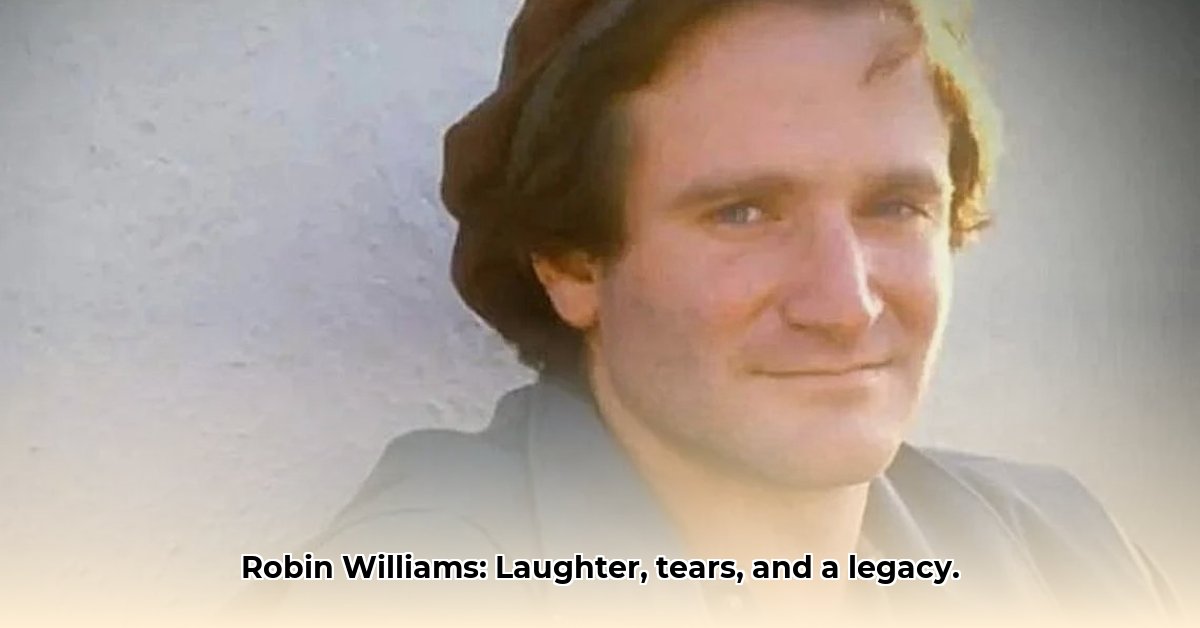
Robin Williams wasn’t just any comedian, is it? He was a force of nature, a comedic supernova whose incandescent energy captivated audiences worldwide. His unique style – a breathless blend of improvisation, physical comedy, and uncanny character work – set him apart. From the lovable alien Mork to the deeply moving Dr. Sayer in Awakenings, his range was astonishing. He could effortlessly shift from manic energy (think Mrs. Doubtfire) to heartbreaking vulnerability (Good Will Hunting), leaving audiences both breathless and deeply moved. But how did he achieve this level of mastery? That's a question that continues to fascinate fellow performers and fans alike. Perhaps his intuitive understanding of human nature, combined with relentless drive, held the key. Did his struggles fuel his creativity? This, too, is worth considering.
Yet, this dazzling public persona masked a private battle with profound personal struggles. Williams openly discussed his battles with depression and anxiety. Later, he was diagnosed with Lewy body dementia (LBD), a devastating neurological condition. This is not some footnote; it's central to understanding the man. The stark contrast between his vibrant public image and his inner turmoil is a poignant reminder that we often see only a curated slice of those we admire, missing the deeper story. And this makes his story all the more compelling, all the more human.
His death in 2014 sent shockwaves globally. It wasn’t just the loss of a beloved actor; it was a catalyst. His passing sparked crucial conversations about mental health, helping to dismantle the stigma surrounding these often-misunderstood conditions. Millions, many who never knew him personally, felt a profound sense of loss. His legacy transcends his impressive filmography; it’s woven into the ongoing conversation on mental well-being, encouraging empathy, support, and access to better care.
Robin Williams's influence on the entertainment industry is undeniable. He left an indelible mark, one future generations will study and attempt to emulate. He’s remembered not only for his iconic roles but for the profound impact he had on audiences – making them laugh, think, and feel deeply, often simultaneously. His talent and struggles continue to inspire, challenge, and illuminate the complexities of the human spirit. Arguably, no other performer so fully embodied this heartbreaking paradox. His legacy is multi-faceted, enduring, and undeniably powerful. He remains a figure of immense joy and profound sadness, a complex individual whose life continues to teach and inspire.
Williams's Enduring Impact
The impact of Robin Williams's life and untimely death continues to resonate across various facets of society.
- Mental Health Awareness: His openness about his struggles ignited vital conversations, leading to increased donations to mental health research and more public figures sharing their personal battles. This has fostered a greater cultural understanding and hopefully more comfortable pathways toward seeking help.
- The Film Industry: His unique comedic style remains deeply influential, inspiring actors and filmmakers alike. His work continues to be analysed and celebrated, ensuring his creative legacy lives on.
- Popular Culture: His films and performances remain incredibly popular, reinforcing his cultural relevance across generations. His life's story serves as a reminder of the importance of addressing mental health concerns openly and honestly.
The information presented here represents our current understanding. Further research and evolving perspectives may add depth to these interpretations. The complexities of mental health, especially when examined within the context of a life lived as intensely as Williams', are subjects worthy of ongoing exploration. Indeed, the ongoing conversation surrounding his legacy is a testament to his lasting influence.
The Shadow of Lewy Body Dementia
Robin Williams' incredible comedic timing and acting prowess were tragically undermined by Lewy body dementia (LBD). This insidious disease gradually eroded his abilities, dimming the brilliance that had captivated audiences for decades. His experience highlights the devastating impact of LBD, a often-misdiagnosed and poorly understood condition.
A Gradual Decline
The impact of LBD wasn't sudden; it was a slow, heartbreaking decline. His rapid-fire delivery, seamless transitions, and impeccable comedic timing – the hallmarks of his genius – started to falter. Initially, these might have been subtle changes – a delayed response, a missed cue, or a flicker of confusion. As the disease progressed, the impact intensified. His legendary improvisational skills, once breathtaking, became less fluid. The words, once a torrent of hilarious wit, slowed, becoming more deliberate.
Imagine a musician whose fingers tremble, unable to produce the melodies once played with effortless grace. That illustrates the impact on Williams's acting. His ability to inhabit a character, to become one with his role, began to fade. The brilliance dimmed, leaving only a shadow of the dazzling performer he once was. Susan Schneider Williams, his wife, has eloquently described the heartbreaking frustration Williams experienced as his mind slipped away.
The Broader Impact
The disease’s impact extended beyond the stage and screen, affecting his interactions with loved ones. The man who could conjure laughter became enmeshed in the frustrating reality of a failing mind. The emotional toll was immense, for both Williams and his family. His story underscores the urgent need to increase awareness and understanding of LBD, and to improve support systems for those affected and their families.
A Legacy of Light and Shadow
Despite LBD's cruel hand, Williams left an indelible mark. His comedic genius continues to inspire, and his performances remain testaments to his exceptional talent. However, his story serves as a poignant reminder of LBD's devastating nature and the critical need for more research, better diagnostic tools, and robust support systems. It reminds us that even the brightest stars can be dimmed by a disease that remains largely unknown.